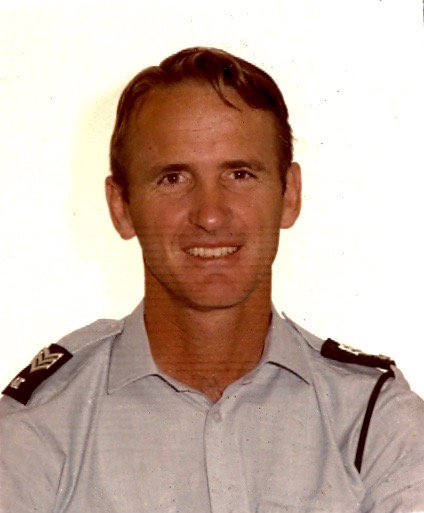
INTRODUCTION - During the past 10 years we have published dozens of interesting articles about the lives of our fellow colleagues who have served in the Bermuda Police, but I doubt there are any more fascinating than this story about a young boy who was living a peaceful life with his family in Jersey in the Channel Islands, located some 100 miles south of England, and 14 miles off the coast of Normandy, France, when their peace and quiet was shattered by the invasion and occupation of Jersey by German Armed Forces during the Second World War..
The young boy was Mike Burke who is probably the only Bermuda Police officer ever to have lived for 5 years under the occupation of a foreign invasion force.
As a young man Mike served in the Military Police, then in the Metropolitan Police before arriving in Bermuda in January 1958 as a young constable in the Bermuda Police. An active sportsman and excellent football player, Mike made his career here and rose through the ranks to Inspector. CLICK HERE to read Mike’s lifestory in our ‘Then and Now’ column.
Following retirement in 1982, he and his lovely wife Carolyn (Cam) retired to his native island Jersey with their family, and they have stayed in close touch with us through our ExPo website.
Early in 2021, Cam happened to mention that Mike had written a story about his childhood memories of the German occupation of Jersey. He did so for the 75th Liberation Anniversary Celebrations. The islands of Jersey and Guernsey both celebrate Liberation Day annually on May 9th. As part of the anniversary celebrations, Mike and others who lived through the Occupation were planning to visit local Secondary Schools to tell their stories to students, but this became impossible because of the Covid -19 lockdown.
After a little persuasion Mike kindly agreed to let us publish his “Occupation Story”, and I trust that our readers will find it as fascinating as I did.
I should add that during the Nazi Occupation of Jersey and the Channel Islands all cameras were confiscated from residents so all photos shown during the Occupation, including those in this article, would probably have been taken by German soldiers, or secretly by someone on the Island, except the photos taken on Liberation Day and thereafter.
Here is Mike's talk:-
Life in Jersey Under Nazi Occupation
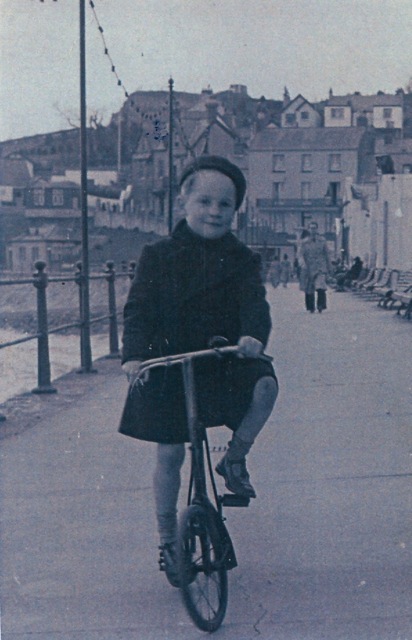
My name is Michael Burke. When the Germans came to occupy Jersey in June 1940, I was 7 years old. I lived at Le Reve, Roseville Street, near the outdoor swimming pool, with my parents, Grace and ‘Bunty’, and my 10 year old sister, Pat.
Early one morning, before the occupation, I saw my parents and some of our neighbours in the front living room listening to the radio. They were panicking because the Germans were advancing through France and they knew the Germans would soon be in the Channel Islands.
My father was in the Honorary Police and had to remain in the island but it was decided that my mother, sister and I would get on one of the last boats leaving for England to stay with my aunt and uncle in Bristol. I created a scene because I didn’t want to leave my bed! However, the car was loaded up with our suitcases but, when we got to the top of Mount Bingham and could see the crush of people at the Harbour wanting to get on a ship, it was decided to return to our home and stay in Jersey - so I didn’t have to leave my bed after all!
Within the next few days, the German planes had swarmed in and bombed La Rocque in Grouville and St. Helier Harbour, also destroying a number of buildings and killing 10 people. The other islands suffered the same fate, with more casualties. I think it must have been about this time that my father and I were on Havre des Pas beach at low water when a German plane flew in low towards us. Dad shouted ‘Get down quick!’ and we threw ourselves flat on the sand. Luckily for us, the pilot must not have seen us, as the plane swooped on and up over the top of Mount Bingham toward the Harbour.
German planes were seen flying low over the island, one of which landed at the airport and the Occupation began. All islanders were ordered to hang out a white sheet or flag as a sign of surrender.
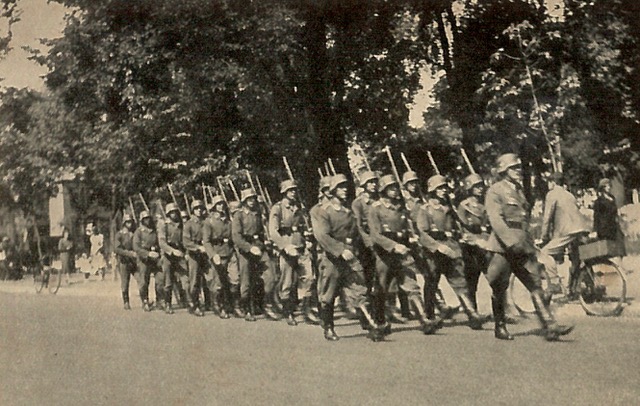 German troops march into St. Helier - July 1940
German troops march into St. Helier - July 1940
Soon, many German soldiers arrived on the island by ship and, as you know, many fortifications were built around the island. The sight of fully armed German soldiers was a shock to all of us. All of the soldiers, from the lowest to the highest rank, thought they were the Master Race and would be ruling the world. The rules and regulations that they made had to be obeyed – or else! During the ensuing five years, islanders were unable to leave. We were virtually prisoners.
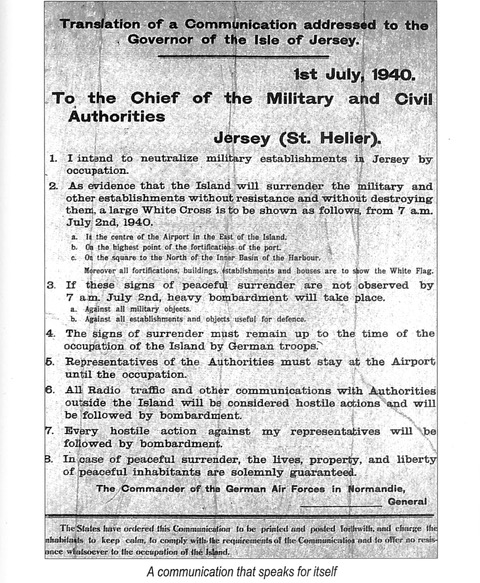 German Proclamation to the people of Jersey
German Proclamation to the people of Jersey
As the Occupation has been well documented in books and the JEP newspaper, I won’t repeat those stories but will tell you stories about some experiences my family and I had during this time.
Within a few days of Occupation, there was knock on our front door and a German officer stood there, looking for accommodation for their men. Despite having 5 bedrooms (only 3 of which were occupied) and a box room, my mother said we had no spare rooms. Fortunately, he spoke English and must have been a nice officer as he didn’t insist on coming in to inspect the house himself but took Mom’s word for it.
The Ommaroo Hotel, located in the same block behind our house, was taken over by German officers, and the big house Silvertide, across from the Ommaroo, was occupied by German Secret Police. For about a year, the horses the Germans used, which had been brought over from France, were stabled in Croydon Lane which ran behind our house.
Victoria College was taken over by Organization TODT, and College House was used by the Field Gendarmerie. We at Junior School were moved to de Carteret House for our schooling. German was a language we were ordered to learn and an officer would attend every so often to check that this was being done. Our large playing field was no longer used for sports but was dug up to grow vegetables.
Reg Nicolle, our sports teacher, would take us to College Hill gym for physical training lessons. He had been in one of the many boats sent to St. Malo in France, about 40 miles south of Jersey, to evacuate British military and civilian personnel in June 1940 ahead of the advancing German army...a very dangerous operation.’ He would tell us in a commanding voice, ‘Now, lads, get on those ropes and PULL – pull with all your might! I was there when those British boys were being rescued and if they couldn’t pull on those ropes, they’d drown! So, pull, lads, pull!’ -- and we’d pull as hard as we could.
Sometimes when we were at the Mount Bingham gymnasium on a Saturday, German soldiers would be there practising on the equipment. We had to stay out of their way and they never spoke to us but, while pretending not to watch, we could see that they were expert gymnasts.
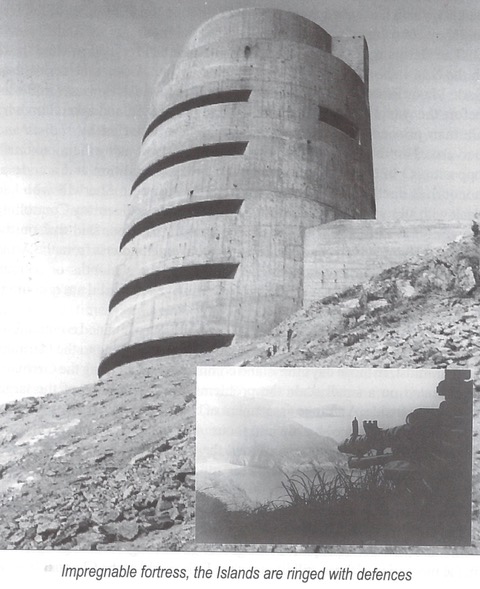
During the next five years, large numbers of soldiers would be marched down Roseville Street singing their marching songs, one of which was ‘I ee, I oh I oh’ and my mother, looking out of our upper front bedroom window, would wrinkle her nose, saying ‘UH!! the smell!!’ – we never knew if the smell was caused from the soap they used or their uniforms. How she hated that spectacle!
They would be marched to the swimming pool and forced into the water whether they liked it or not. They would be swung out over the water on a rope, dropped in and then have to swim back to poolside as best they could. When they had all left the pool area and it was all clear, my friends and I would search the cabins they used and once found a packet of cigarettes and a few other odd and ends.
Like other islanders, our car was taken away by the Germans, never to be seen again. Radios were also confiscated so that we wouldn’t be able to listen to English news about the progress of the war. However, my father was a painter and decorator and cleverly hid ours behind a wallpapered-over space in an upstairs wall – so-- we still had our radio at the end of the war.
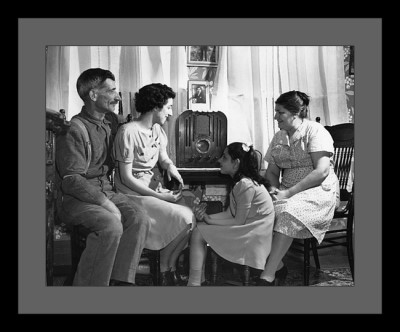 Radios played a vital role in keeping people informed during the War years
Radios played a vital role in keeping people informed during the War years
Dad had a crystal radio set, part of which I still have, made locally, which enabled us to secretly listen to the BBC news. One morning, our baker had come through the back door to listen to the latest news with us when my mother, keeping watch at the front window, saw a German car stopping outside our house and she called a warning to us. The radio was quickly hidden under the secret loose floorboard under the carpet in the front hallway. The baker jumped out our back window, ran through our garage, grabbed his bike and pedalled away as fast as he could up the back lane. When he got back on Roseville Street, further up from our house, he heard the car coming up behind him and thought he was in big trouble! Much to his relief, the car went past him without stopping -- but he was so afraid of being caught that he never came again to listen to the news on our crystal set.
Food and clothing were hard to come by. Clothes would be second hand. In 1944 and 1945, children wore wooden clogs when they were no longer able to get shoes to fit. Fuel became in very short supply – no coal; no gas; every little piece of found wood was taken home for the fire. There was no electricity so we needed candles, which were also in short supply, for light. Mom sold most of her jewellery and silver to buy food. Dad managed to get some butter and tea for £20 (a lot of money in those days!) on the Black Market before 1944, but the butter was rancid and the tea was mouldy!
We had a few chickens in the back garden for eggs, and food for them was also hard to find, but Dad managed to find enough to keep them healthy. When he helped my Uncle Artie harvest the wheat on his farm at the foot of Longueville Hill, he would hide some grain in the cuffs of his trousers -- a real treat for the chickens when he got home.
There were bake-house ovens in various areas of the island where islanders could take whatever food they could put together and it would be cooked for them to take back home.
We weren’t supposed to go on the beaches at night and they were barricaded by barbed wire, but my father and his friend Mr. Cooper had forced a space through the wire. They would wait until it was all clear at night at low water, then sneak down and check for fish in nets they had put down. One night, just before daylight, I had been allowed to go with my father, Ted Croad and Fred Cooper to check the nets by ‘The Three Sisters’ (3 large, high rocks about 200 yards out to sea from the Havre des Pas promenade that are still above water at high tide). It turned out that two other men were also on the beach checking their nets near the end of the long sewer at the Dicq opposite the Normandie Hotel when we heard a tremendous bang, and then two or three shells from Mount Bingham whizzed over us and landed beyond the other two men. They - and the four of us - sure didn’t stick around but ran back to safety as fast as our legs could take us! Had the other men been spotted on the beach? -- or was it just a shooting practise?
There was a curfew and we were not allowed out after dark though, as you can tell by the previous story, some folks sometimes took chances. In the evenings, my family would gather in one room with a small fire and candle light. We’d play card games called whist, put and take, and twenty-one; and board games like Mah Jong, bagatelle, monopoly and checkers to amuse us and then we’d go to bed about 8.30. In the cold weather, the rest of the house would be freezing, and Dad wore his cap to keep his head warm whenever he went upstairs.
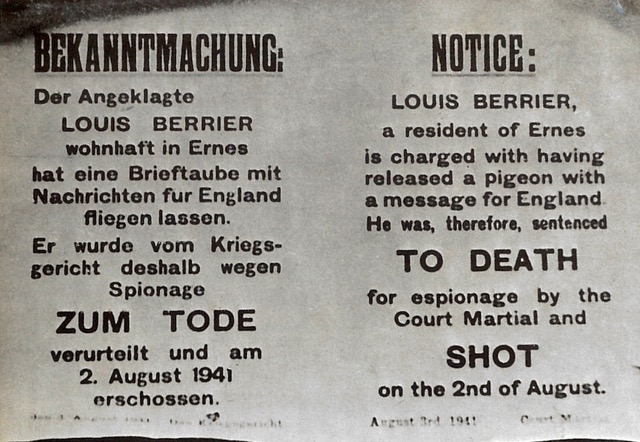 Proclamation such as this one were typical throughout the Occupation
Proclamation such as this one were typical throughout the Occupation
Riding our bikes to school, a German soldier driving a horse-drawn wagon up Mont Millais would let us hold onto the back of the wagon and be pulled up the hill -- so they weren’t all bad. One soldier seemed to pick on my father some mornings on his way to work. He would stop Dad and tell him he wasn’t riding his bike properly. He would then order Dad to get off his bike and he would show him how he thought he should be riding it. He was probably just trying to be friendly but Dad took offense and on Liberation Day kept a sharp lookout for him but, fortunately for the German soldier, he didn’t see him.
Hose pipes were used for tires when bike tires were no longer available.
The Germans had a railroad built along the promenade at Havre des Pas from Gorey for hauling sand for building their concrete fortifications. Prisoners of war slave workers were made to lay the rails, wearing ragged clothes, and were badly in need of food. My mother would give me a scrap of bread or vegetable to drop near them after making sure no guards were looking my way and these scraps were quickly snatched up by them.
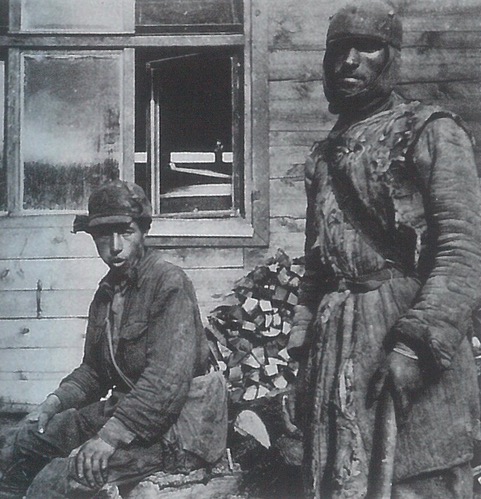 Russian prisoner of war "slaves"
Russian prisoner of war "slaves"
Mrs. Nichols and her daughter, who lived in the corner house nearly opposite ours and opposite the outdoor pool, entertained German officers. Women who entertained soldiers were called ‘Jerry bags’ by the islanders but, bear in mind that it seemed Germany was going win the war, and these women would receive food and supplies from the officers that were unavailable to other people.
Living beside our house was a family with young boys who were very anti-German. After D-Day, when I was 11, swastikas were painted on the side of Mrs. Nichols’ house one night. She told the Germans that the next door boys and I were responsible for this, which resulted in us being ordered to appear at College House with our fathers for questioning. This was a very serious situation, which could have resulted in very severe consequences for our fathers and ourselves. None of us knew who was responsible for the swastikas but we were severely reprimanded and, thankfully, were allowed to leave and return home. After Liberation Day, it was admitted to our fathers by older boys in the neighbouring houses that they had been the culprits, but they had been afraid to speak up and admit it at the time.
One day, my friends and I were playing on Mount Bingham when we looked over the wall above Pier Road. German soldiers were guarding the tunnels in the wall opposite La Folie Inn and we decided to drop stones down on one soldier’s helmet. He immediately looked up and spied us and started running, with his rifle, to climb the steps up to us but by the time he’d arrived at the top, no doubt out of breath, we had disappeared down Rope Walk. ( note: this wall and steps are about 40 feet high).
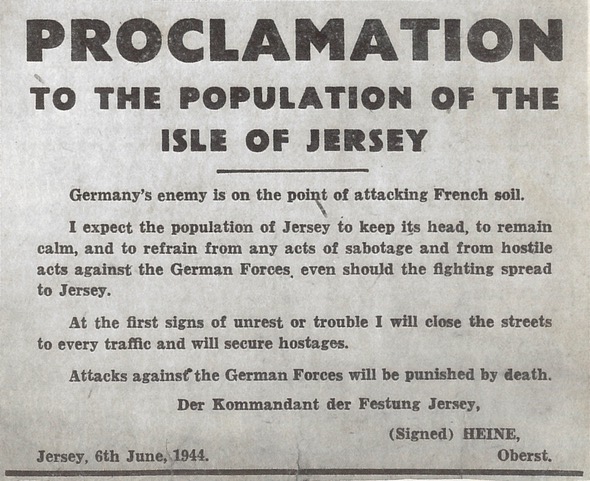
On D-Day, 6th June 1944, when the allied forces attacked the German forces on French beaches, we could hear and see a sky full of planes on their way to bomb German fortresses.
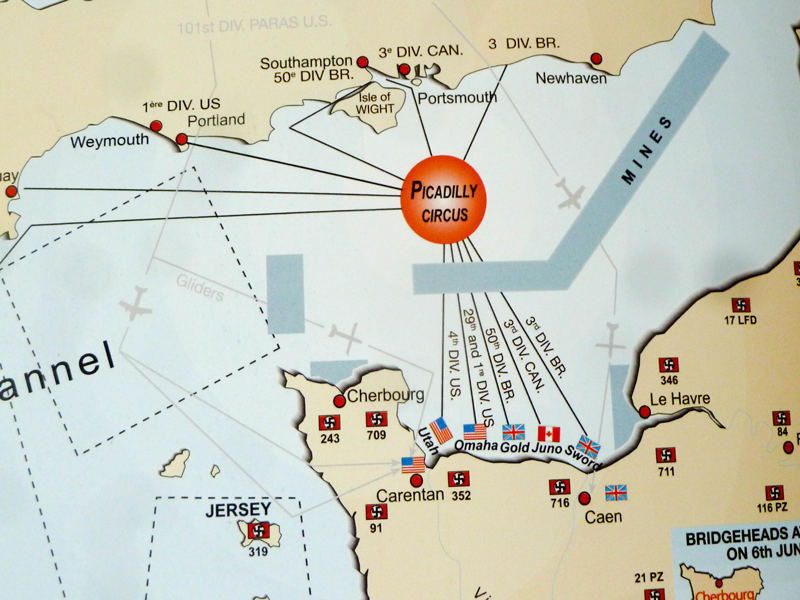
One day, my mother and I were looking out of the upper front bedroom window when we saw German guns shooting at an allied aircraft flying low off Noirmont Point. Mom prayed to God that the plane wouldn’t be hit.
Some American ships were captured by the Germans after D-Day and the American personnel were brought to Jersey and imprisoned behind Mount Bingham gymnasium where car parking tests are now done. The area was fenced in so no prisoners could be seen. By this time, the Red Cross ship, S. S. Vega, was arriving with welcome parcels of food, mainly from Canada, for each island resident.
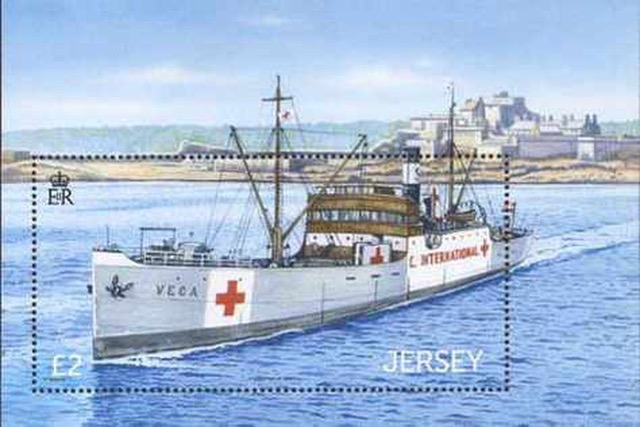
EDITORS NOTE ---In May 2013 the Jersey Post issued a stamp recognizing the vital role played by the S.S. Vega in saving Islanders from starvation during the Occupation.
We boys collected salmon tin labels from the tins in these parcels in place of the toys that we could no longer buy. The American salmon tin labels were different from the Canadian labels and highly prized by us. My friends and I called over to the prisoners, (strictly ‘verboten’, of course), asking them to save their labels for us and to throw them over to us, which they did, having put them in an empty tin, when both sides were sure it was all clear for them to do this.
One evening, we gave them the all clear to toss the tins over when we suddenly heard the sound of soldiers marching up the hill towards us. We called to the Americans not to throw the tin over and quickly disappeared down Rope Walk lane which is behind Green Street, but they didn’t hear our warning and threw the tin over just as the soldiers passed. After Liberation, we saw one of the Americans who said they’d been in big trouble over this tin as the Germans thought they were sending secret messages out. So that was the end of Operation Salmon Tin Labels .
The Red Cross parcels from S. S. Vega were like gold as we were starving and most people were very thin. The parcels helped to keep us going with Klim powdered milk, Spam, salmon, chocolate, flour, sugar, cigarettes, very welcome soap, and other goodies.
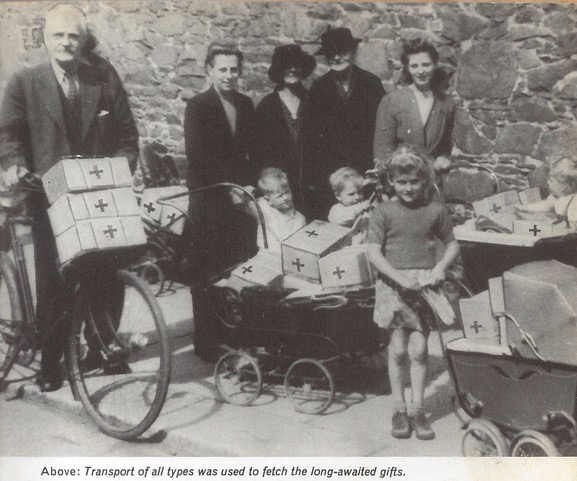
Despite the hardships of the Occupation, as young boys my friends and I had many adventures and had a great time. We played hockey on roller skates in Cleveland Road, which broke most of our fathers’ walking sticks; whizzed down Mount Bingham on our roller skates; and played football on F.B. Fields with many other youngsters in the area. Footballs were in short supply but my friend and I had one which was much mended. Our footballs were nothing like today’s light footballs, being made of heavy leather with a bladder inside that needed to be pumped up. We were free to roam wherever we wanted, except ‘off-limits’ German areas. There was very little traffic on the roads apart from bicycles and soldiers’ vehicles.
 Winston Churchill broadcasting on the BBC
Winston Churchill broadcasting on the BBC
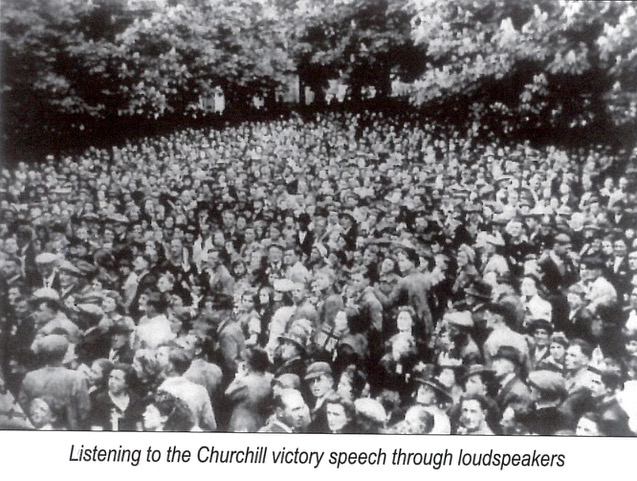
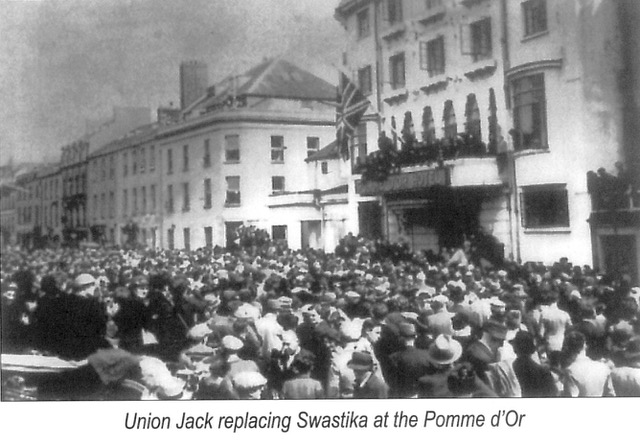
May 9th 1945, Liberation Day – what a wonderful day! We had heard Winston Churchill on the radio say ‘And our dear Channel Islands will also be freed’. The British soldiers and sailors arrived and what a sight they were for us, and once again the beautiful Union Jack was appearing all over the island and the German swastika flags were torn down and our radio was played again. Soon the defeated German soldiers, no longer looking smart in their uniforms, were collected together in camps and then loaded onto landing craft at Bel Royal beach and sailed away to prison camps elsewhere. I thought they were all going to be dumped at sea and I’m sure they also wondered what was going to happen!
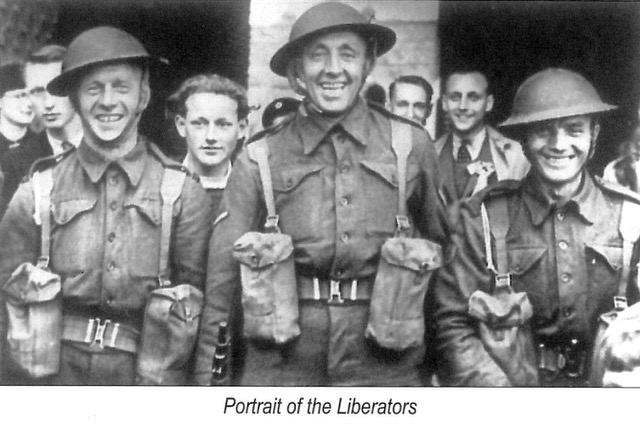
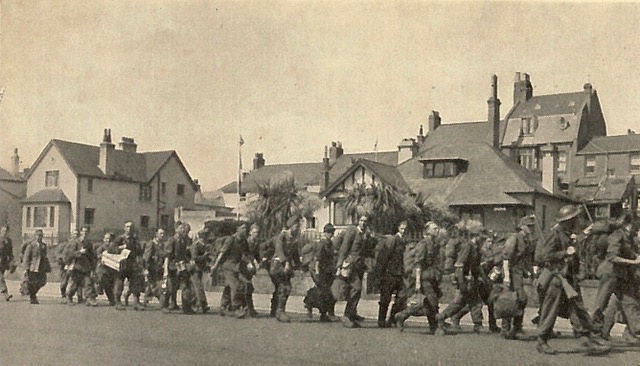
In the excitement of that day, I was running all over the place to see what was going on. Many of the residences once occupied by the Germans, including gun emplacements and forts, were left with supplies inside. I went into a lot of these places where ammunition, guns, and hand grenades were still lying on the shelves. I gathered up a bagful of military equipment which I took home. Being an Honorary Policeman, my Dad was horrified by this and threw them in the sea. I couldn’t believe that he had thrown my treasures away! -- so up I went again and collected more -- BUT -- on the way home I was met by an older boy who offered me a lot of candles in exchange for my guns and ammunition. I thought Mom would love the candles, so I gave everything to the boy and went home with only the candles and a small alarm clock. It turned out to be a poor exchange as the electricity was once again on and the candles were no longer needed for light. Oh well! -- Dad would have thrown my second bagful away, too, when he found it.
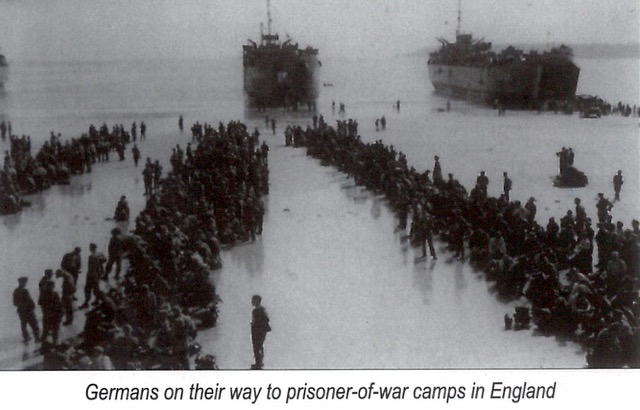
These are just a few of the many stories I could tell you about the Occupation years I lived through. However, I think we must consider ourselves very fortunate and bear in mind that if Hitler’s Germany had won the war probably none of us would be here today.
I hope you have enjoyed listening to my tales.
Thank you for listening.
P.S. During the war, the secret song that my friends and I sang was:
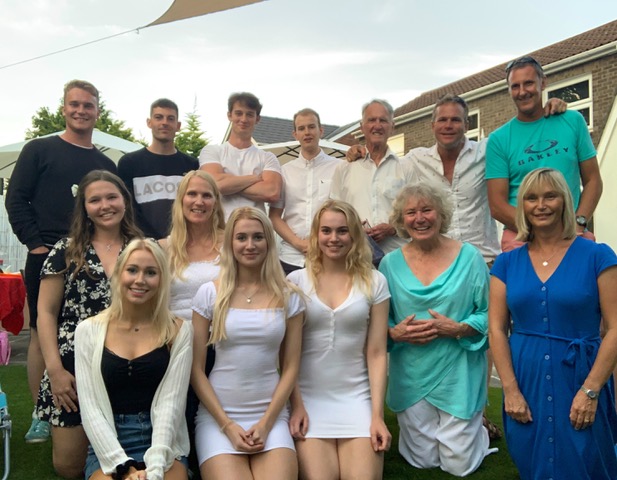
When asked about how Jersey is handling the Covid crisis Cam wrote, "The situation in Jersey is that the Government started relaxing the rules and have let tourists in again but after finally having 0 cases of Covid, there are now over 300 positive cases (but not hospitalised) and they think this may climb to 500 in the next few days. It seems the latest strain, the Delta variant, can affect people even after their 2 vaccines. They have also relaxed the rule about wearing masks in shops but Mike and I still wear ours and when I went to the doctor this morning everyone had masks on, including doctor and staff.
Re our dancing, we think it is finished as our only remaining hotel that had dance evenings (and where we so enjoyed the trio) has plans to be torn down and turned into apartments. Oh well, I think our old legs have just about had it, anyway!"
5th July 2021
Editors note - Unfortunately, the comments section below these articles is still out of action, but we have received the following comment from our good friend Ray Sousa via email:-